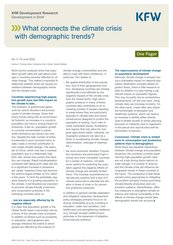
The One Pager, which was commissioned by the KfW Development Bank, explains whether the climate crisis can be linked to demographic trends.
Read more
Over recent decades, economic growth has declined dramatically in all industrialised countries. This is the result of structural changes in developed societies. First, population growth is slowing. Second, innovation potential and productivity are only increasing slowly, despite globalisation and digitalisation. Third, inequality is increasing and limiting the consumption potential of lower income groups. Finally, environmental damage is exerting a decelerating effect on economic development. Classic cyclical economic policy is ineffective in the case of a structurally-caused reduction in growth. So far, growth has been vital for states, businesses and society. If economic growth remains low in the context of secular stagnation, developed countries will need to carry out fundamental macroeconomic transformations.
The Berlin Institute would like to thank the Daimler und Benz Stiftung for supporting this research project.
Demographic change is not a disaster, but a challenge. Analyses and concepts are needed to master them successfully. The Berlin Institute for Population and Development provides these free of charge and makes a significant contribution to ensuring that important future issues are discussed on a broad basis and put on the political agenda. The non-profit Berlin Institute works on a non-partisan basis and receives no state funding whatsoever. Your donation therefore helps to maintain our independence and the high standard of our publications. Donations to the Berlin Institute are tax-deductible and can be made directly online using the donation button or by using a bank transfer form to the following account
Donation account
GLS Bank
IBAN DE15 4306 0967 1276 4833 00
BIC/SWIFT GENODEM1GLS
We thank you very much for your support!